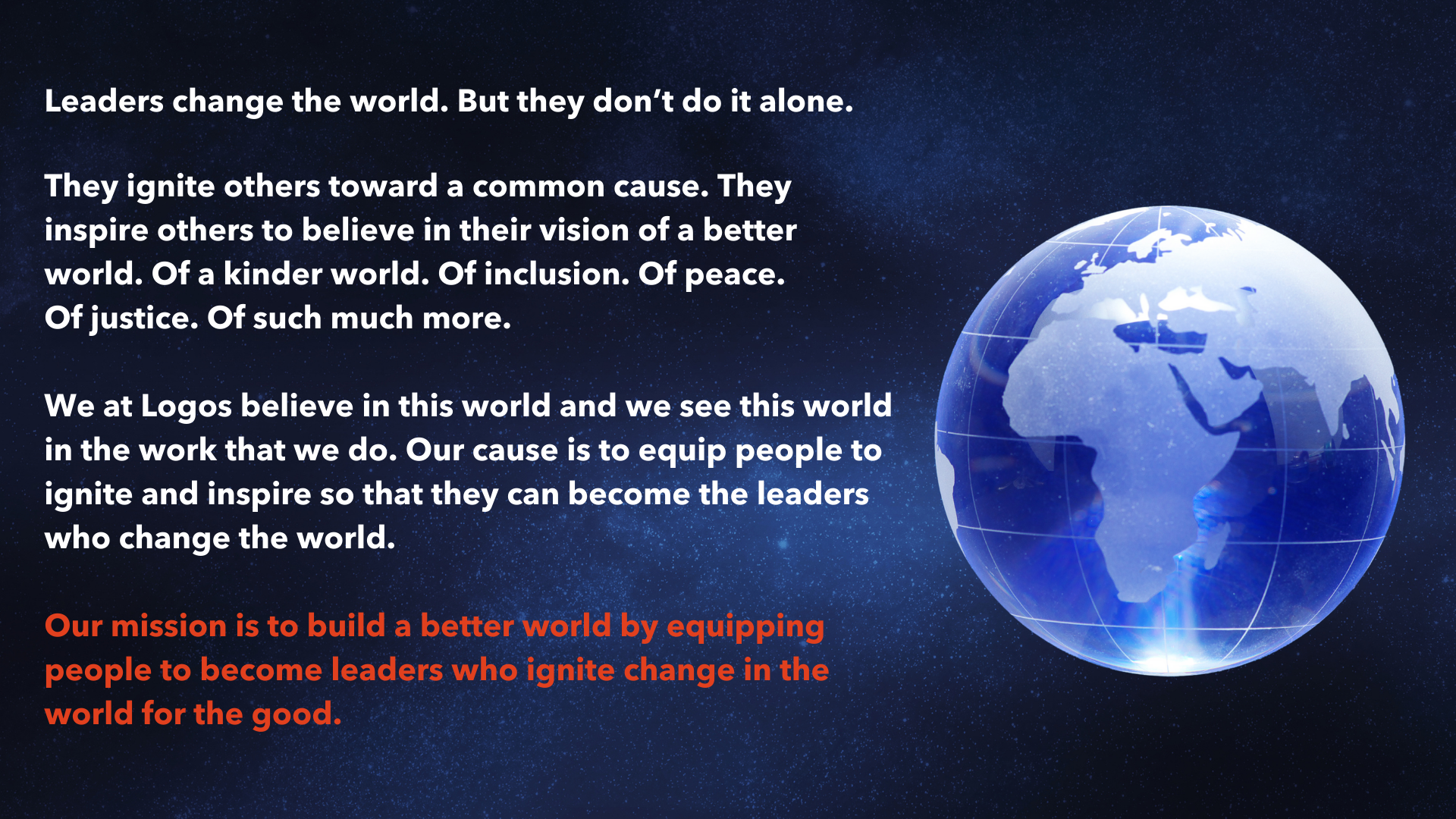Logos Consulting Group’s mission is to build a better world by equipping people to become leaders who ignite and inspire change for the good. We do this in many ways, including in the work we do with clients.
Many of our clients are leaders in their industries – in banking, insurance, finance, pharmaceuticals and life sciences, healthcare, manufacturing, consumer products, hospitality, professional services, and the U.S. armed forces. And we’re very proud of the work we have done with them over the past two decades.
But when we were founded 20 years ago, we made a deliberate decision to commit meaningful time – sometimes as much as 30 percent of our time – to causes we care about without regard to compensation. Since then, we have maintained a robust pro bono publico practice. Some pro bono clients pay us nothing. Some pay a nominal fee, often a single-digit percentage of our usual rates. And for some, we make financial contributions in addition to the work we do with them.
Pro Bono Publico – Literally, For the Public Good
Our pro bono practice has included meaningful work in human rights; civil rights; arts and culture; education; religious and multi-religious organizations; and youth education, development, and sports; among many sectors.
And our philosophy of pro bono service is clear: pro bono clients get the same level of service, attention, and commitment as our commercial clients. If we have a scheduled commitment with a pro bono client and then a commercial client asks for the same time, we keep the original appointment and seek to find another time for the commercial client.
In this 20th Anniversary Reflection, I focus on just two of the areas of our pro bono practice: multi-religious advocacy and youth education, development, and sports.
Multi-Religious Advocacy
One of my personal pro bono priorities is helping to equip multi-religious organizations to be better able to fulfill their missions. Over the past 20 years I’ve advised, taught, or led more than a dozen multi-religious organizations, including serving on five of their boards and chairing two of them. Over the years, many Logos team members participated in our multi-religious advocacy work.
Religions for Peace
Logos’ second client, one month after our founding, was Religions for Peace, the largest multi-religious organization in the world. Religions for Peace helps leaders of religious communities around the world harness the moral authority of their faith traditions to prevent violence, transform conflict, protect the earth, and promote peaceful, just, and inclusive society. In my prior job, I had attempted to secure pro bono client status for Religions for Peace, but my employer was unwilling to invest in pro bono activities. So, all my work at the time was personal and off-the-clock. Upon founding Logos, Religions for Peace became an important client in the life of our young firm.
Both I and the Logos team have deployed around the world for Religions for Peace.
Twenty years ago, I and a Logos colleague deployed to Amman, Jordan just weeks after the U.S. declared Mission Accomplished in Iraq. We were advisors to our client as it negotiated with Iraqi religious leaders – Arab and Kurd, Sunni and Shia Muslim and Christian – to create the Iraq Inter-Religious Council for Peace. It was the first time that Iraqi Sunni and Shia leaders had been in the same room together since before Saddam Hussein’s reign, and it was the first time they had been in the same room with Christian leaders in their lifetimes. Also present were dozens of religious leaders of many faith traditions and civil society leaders from around the world. They were there as observers, to bear witness to the proceedings and to testify to the effectiveness of inter-religious cooperation.
We also arranged for the international press to cover the announcement of the creation of the Council.
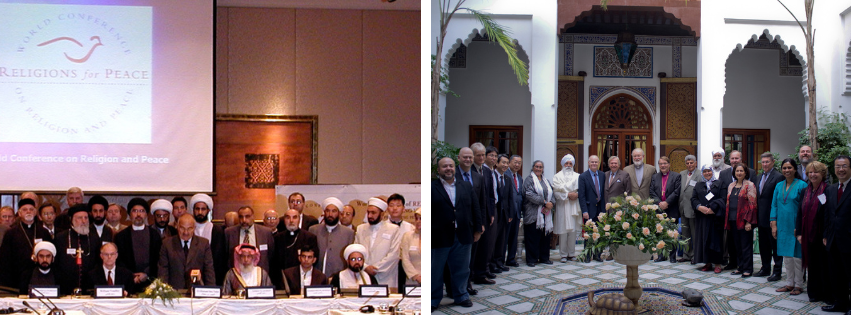
L: The announcement of the creation of the Iraq Inter-Religious Council for Peace, Amman, Jordan, May 2003
R: Religious leaders celebrate the creation of the Middle East North Africa Inter-Religious Council for Peace, Marrakesh, Morocco, November 2011
In 2011, after the Arab Spring, I deployed to Marrakesh, Morocco to advise our client as it negotiated with religious leaders of all faiths from all nations in North Africa and the Middle East to create the Middle East North Africa (MENA) Inter-Religious Council for Peace.
World Assemblies of Religions for Peace
Every six or seven years, Religions for Peace convenes the World Assembly of Religions for Peace, bringing together thousands of leaders of the world’s faith traditions for work on conflict transformation, sustainable development, and protection of the earth.
At the eighth World Assembly in Kyoto, Japan in 2006, six Logos team members deployed to advise our client and manage communication. I served as spokesperson for the Assembly and moderated the press conferences with religious and civil society leaders.
At the ninth World Assembly of Religions for Peace in Vienna, Austria in 2013, five Logos team members deployed to advise our client, create our client’s first social media channels, and manage the newsroom and Assembly communications.
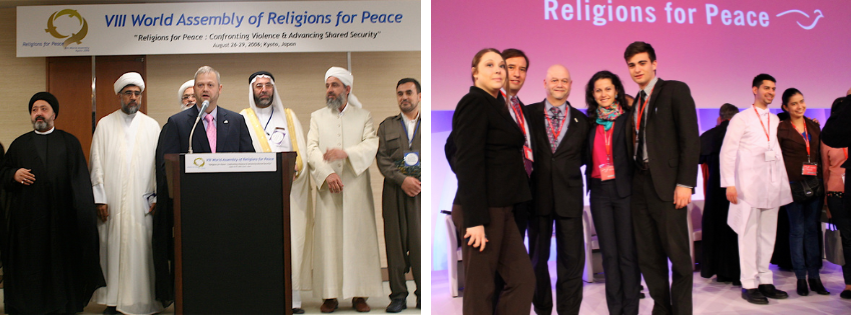
L: Moderating a press conference of Iraqi religious leaders at the VIII World Assembly of Religions for Peace, Kyoto, Japan, August 2006
R: The Logos team at the IX World Assembly of Religions for Peace, Vienna, Austria, November 2013.
In 2014, as a complement to the United Nations Summit on Climate Change, we deployed in our home city for the Interfaith Summit on Climate Change sponsored by Religions for Peace and the World Council of Churches. Logos advised our client and helped its staff manage communication on a multi-religious commitment to use the moral authority of faith traditions to call for action to protect the earth.
In 2019, I deployed to be the English-language spokesman for the tenth World Assembly of Religions for Peace in Lindau, Germany.
Board of International Trustees
From 2011 to 2020, I had the privilege of serving on Religions for Peace’s Board of International Trustees.
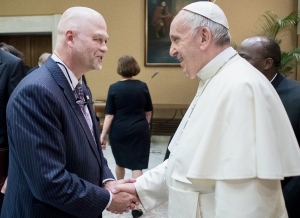
Meeting His Holiness, Pope Francis, the Vatican, November 2017
One highlight of that service was our 2017 Board meeting in the American Academy in Rome. The meeting began with a private Board audience at the Vatican with His Holiness, Pope Francis.
Pope Francis addressed the board, which includes one of his representatives, and noted:
“You provide a valuable service to both religion and peace, for the religions are bound by their very nature to promote peace through justice, fraternity, disarmament and care for creation. There is a need for a common and cooperative effort on the part of the religions in promoting an integral ecology. The Bible helps us in this regard by reminding us of the Creator, who “saw all that he had made, and it was very good” (Gen 1:31). The religions have the wherewithal to further a moral covenant that can promote respect for the dignity of the human person and care for creation.”
Although I have not been a Roman Catholic for 50 years, and have often been skeptical of prior Popes, I have always had a great appreciation for Pope Francis. I was honored that both I and my wife, Laurel Colvin, were able to meet His Holiness and spend precious moments in private conversation.
In 2020, I stepped down from the Religions for Peace board after 10 years. I remain an International Goodwill Ambassador.
Interfaith Alliance
In the United States, much of Logos’ pro bono multi-religious work has been with Interfaith Alliance, based in Washington DC. Interfaith Alliance protects and promotes America’s religious pluralism and helps to protect at-risk religious communities that are often targets of extremism. Logos has actively supported Interfaith Alliance for 20 years. From 2007 to 2020, I served as a member of the Board of Trustees, and as board chair from 2014 to 2017.
One of my favorite Interfaith Alliance initiatives is the Walter Cronkite Faith & Freedom Award.
In addition to being a respected journalist and one of the most trusted men in America, Walter Cronkite served as the honorary chair of Interfaith Alliance from 1997 until his death in 2009. He joined the organization, he said, because “nothing less is at stake in the work of the Interfaith Alliance than the existence of democracy as we know it.”
The Walter Cronkite Faith & Freedom Award recognizes those whose courageous actions embody the values of civility, tolerance, and cooperation in the advancement of public dialogue and public policy on traditionally controversial issues.
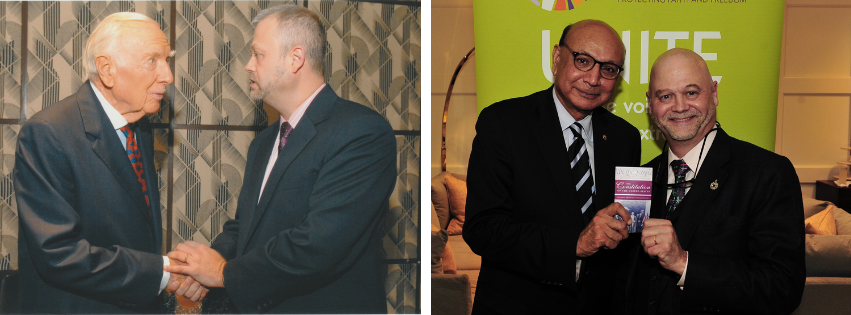
L: With Walter Cronkite at an Interfaith Alliance Cronkite Award Gala, 2007
R: With Khizr Khan displaying my copy of the U.S. Constitution, 2017.
Cronkite Award recipients include George Clooney, MSNBC host Rachel Maddow, ABC News anchor Peter Jennings, NBC News anchor Tom Brokaw, CNN’s Larry King, PBS’s Jim Lehrer and Bill & Judith Moyers, and immigrant American and Gold Star Parent Khizr Khan.
Youth Education, Development, and Sports
Over the years many Logos teammates have done meaningful service with organizations that educate, inspire, and mentor youth. This includes leading youth groups in religious communities; helping prepare teenagers for the process of applying to college; and helping teens develop confidence, leadership ability, and the tools for success as they grow into adulthood.
The Dorill Initiative
One such organization is The Dorill Initiative, a nonprofit arts education organization based on the Lower East Side of Manhattan. The Dorill Initiative was founded in 2018 by Tareake Dorill to provide a platform for future generations in underserved, overlooked, and often forgotten communities to harness their expressive energies for social justice through the arts.
The Dorill Initiative’s founding principle is Love Through Art. The organization helps its students share their stories and transform communities through artistic and creative expression, academic enrichment, and civic and community engagement.
The organization strives to cultivate the whole citizen artist and help young people become DoERs – people who show up, put word to action, and work to create meaningful change in community. Dorill reinforces young citizen artists’ limitless potential and ensures their families and the larger community are part of their growth artistically, academically, and personally.
Logos Chief of Staff and Advisor Katie Garcia, who is an accomplished competitive dancer, joined the Dorill Initiative’s DoER Board in 2020. She has served as the organization’s Board Chair since 2021.
“As someone who has been profoundly transformed and healed by the arts, I am passionate about ensuring all young people have access to holistic and transformative arts education,” Katie explained. “What is special about Dorill is the way this program meets our young citizen artists where they are – seeing our youth as whole people and equipping them to share their authentic truth in a safe, supportive, and loving way. Every child deserves that kind of transformative arts education.”
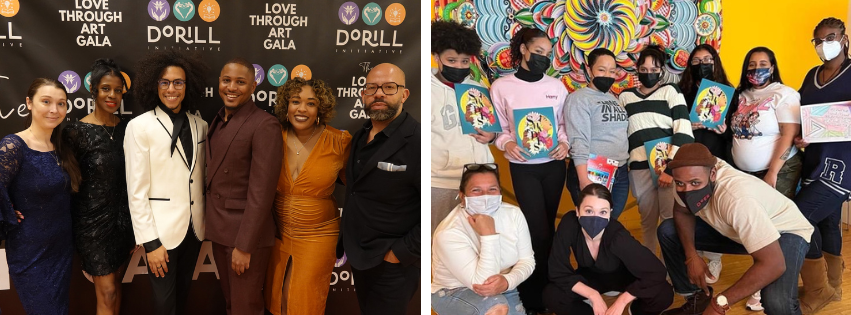 “Three years after joining the Dorill board, I continue to be inspired every time I have an opportunity to watch our young citizen artists perform, speak with a DoER parent, and engage with members of our DoER community,” Katie reflects. “I am excited to see Dorill’s programs grow in the coming years – engaging more communities and transforming more young people – and am immensely proud to be a small part of that work.”
“Three years after joining the Dorill board, I continue to be inspired every time I have an opportunity to watch our young citizen artists perform, speak with a DoER parent, and engage with members of our DoER community,” Katie reflects. “I am excited to see Dorill’s programs grow in the coming years – engaging more communities and transforming more young people – and am immensely proud to be a small part of that work.”
Youth Volleyball to Build Confidence, Teamwork, and Leadership
Logos’ commitment to developing youth is also manifest in work Logos teammate Maida Kalic Zheng did with young people in Virginia in Alexandria, Virginia.
Maida joined Logos in 2019 after 7 years as an officer in the United States Marine Corps. She is an Advisor at Logos.
Maida played Division 1 Volleyball at the U.S. Naval Academy as a middle blocker.
“I was not a good volleyball player before making the team at the Naval Academy,” jokes Maida. “But the head coach believed I was coachable and explained to me that he wanted to give me a shot. Him taking a chance on me and giving me an opportunity had an incredible impact on me.”
Maida came to the U.S. as a refugee in 1999 following the Bosnian War. She spent years moving from country to country before settling down in Utica, New York.
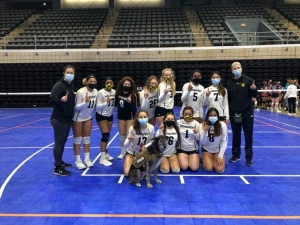 “I didn’t really speak English when we moved to the U.S., so school was hard. Sports became my passion, my outlet when life was hard,” said Maida. “I delighted in the idea that I was able to work with a team that did amazing work but also gave back. So, when the opportunity for me to coach and make an impact in my local community arose, it was a no-brainer.”
“I didn’t really speak English when we moved to the U.S., so school was hard. Sports became my passion, my outlet when life was hard,” said Maida. “I delighted in the idea that I was able to work with a team that did amazing work but also gave back. So, when the opportunity for me to coach and make an impact in my local community arose, it was a no-brainer.”
Maida coached volleyball in Alexandria, Virginia for Monument Volleyball Club where she implemented a leadership and resiliency program.
Logos’ Ongoing Commitment
Whether at the global level, the national level, or the community level, Logos will continue to work to build a better world by equipping people to be leaders who inspire and ignite change for the good. Literally, pro bono publico, for the public good.
This reflective piece is part of our 20th anniversary celebration. Throughout this anniversary year, we will be sharing a series of reflections on the shifts and trends we have been following in business and in the world over the past twenty years, as well as advice to leaders and organizations navigating through the challenges we see today.





 “Three years after joining the Dorill board, I continue to be inspired every time I have an opportunity to watch our young citizen artists perform, speak with a DoER parent, and engage with members of our DoER community,” Katie reflects. “I am excited to see Dorill’s programs grow in the coming years – engaging more communities and transforming more young people – and am immensely proud to be a small part of that work.”
“Three years after joining the Dorill board, I continue to be inspired every time I have an opportunity to watch our young citizen artists perform, speak with a DoER parent, and engage with members of our DoER community,” Katie reflects. “I am excited to see Dorill’s programs grow in the coming years – engaging more communities and transforming more young people – and am immensely proud to be a small part of that work.” “I didn’t really speak English when we moved to the U.S., so school was hard. Sports became my passion, my outlet when life was hard,” said Maida. “I delighted in the idea that I was able to work with a team that did amazing work but also gave back. So, when the opportunity for me to coach and make an impact in my local community arose, it was a no-brainer.”
“I didn’t really speak English when we moved to the U.S., so school was hard. Sports became my passion, my outlet when life was hard,” said Maida. “I delighted in the idea that I was able to work with a team that did amazing work but also gave back. So, when the opportunity for me to coach and make an impact in my local community arose, it was a no-brainer.”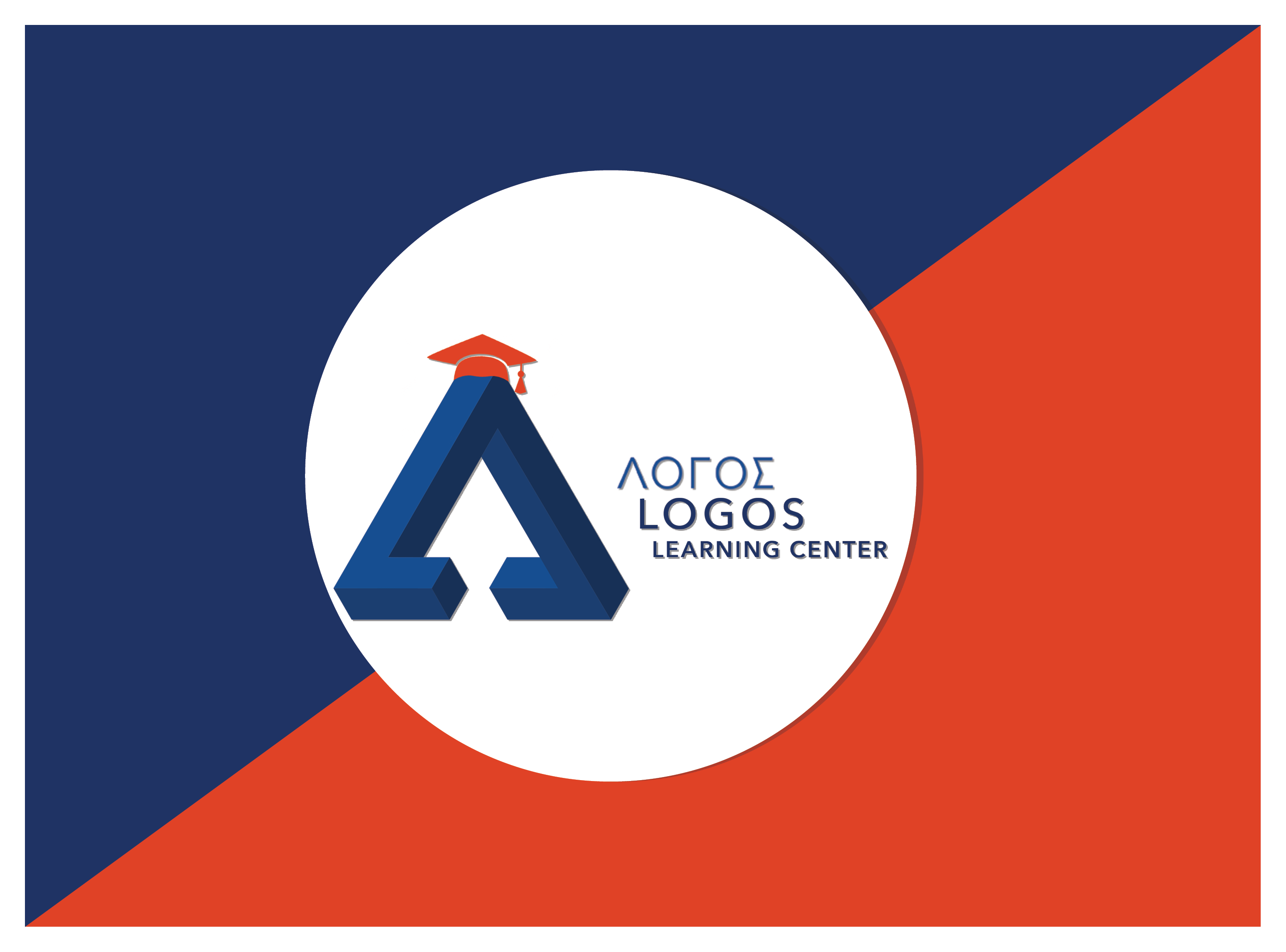 Logos President Helio Fred Garcia was quoted in Carol Roth’s Business Unplugged blog on his 2021 New Year’s business resolution. In this post, Roth highlights the business resolutions of more than 100 leaders from across industries for the new year.
Logos President Helio Fred Garcia was quoted in Carol Roth’s Business Unplugged blog on his 2021 New Year’s business resolution. In this post, Roth highlights the business resolutions of more than 100 leaders from across industries for the new year.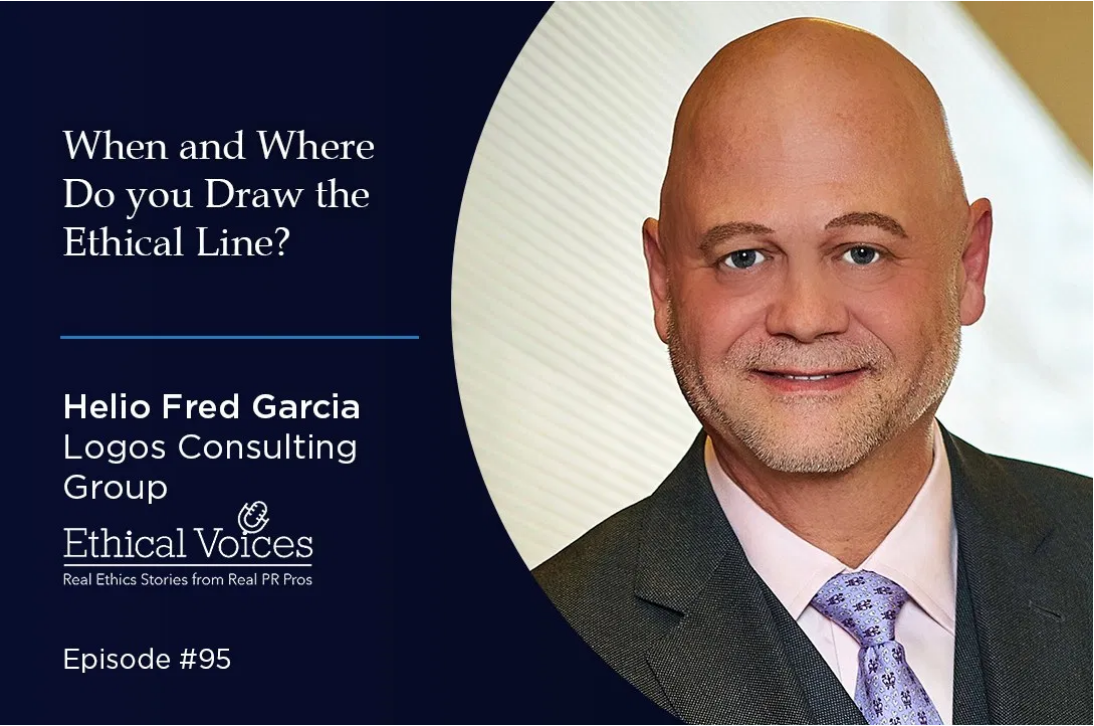 On November 9, 2020, Logos President Helio Fred Garcia spoke with
On November 9, 2020, Logos President Helio Fred Garcia spoke with 